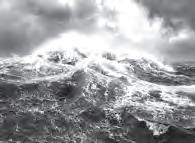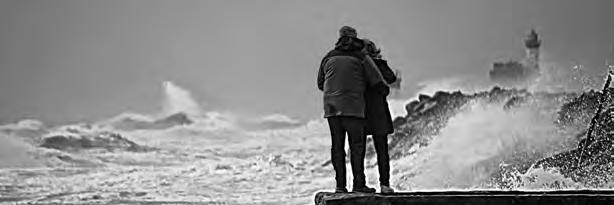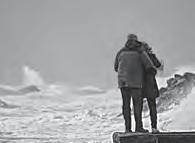Clinging to Hope in the Storm





Save me, O God, for the floodwaters are up to my neck. Deeper and deeper I sink into the mire; I can’t find a foothold. I am in deep water and the floods overwhelm me. I am exhausted from crying for help. (PSALM 69:1–3 NLT)
I’vebeen in many storms on the ocean in Alaska, but one stands out in which I was sure I would die. It was September, when the weather often turns stormy. There were three of us—my husband, my father-in-law, and me—on a 25-foot speedboat.
After a long commercial fishing season, one hundred miles of open ocean lay between us and home. Despite waiting for a calm morning, the sky

turned dark within twenty minutes of our departure. Huge waves heaped and curled above the small craft. The wind howled in our ears.
Then one of our engines blew. Sideways in the curl and trough of the sea, we took on water with the break of every wave. As the boat sank lower and lower, we scrambled to put on our survival suits. I was scared, knowing we could all die. Our crippled boat fought the angry seas for three hours until we limped into the shelter of a bay and the homestead of an old man who took us in.
In the Bible, the Gospels tell us of two perilous storms on the Sea of Galilee when the disciples feared for their lives. Both times, in the midst of the gale, they experienced a confusing mix of emotions, as I did in my storm. Jesus was with them, but his presence did not instantly end the danger. They were desperate for his protection, yet they were uncertain of his love. The inner storm this caused was even worse than the storm itself.
Storms come to everyone, not just fishermen. All of us experience struggles and trials throughout our lives. Sometimes it seems as if a trial will never end. You may be there right now, facing sickness, divorce, financial troubles, a prodigal child, a crisis of faith. But hang on, because even when the storm is still raging, Jesus brings real hope and good news in the midst of it.
Leslie Leyland Fieldscontents one God doesn’t ask us to walk on water.
two
Even when it seems that Jesus is “sleeping” in your boat, He is still with you and for you.
three Don’t wait to call on Jesus.
four
No storm is random, trivial, or without purpose.
five When the storm is relational, God has equipped us to love and forgive.
23 six Even if our boat sinks and we go under, we’re still safe.
EDITORS: Monica Brands, Tim Gustafson, J.R. Hudberg, Peggy Willison COVER IMAGE: © Shutterstock.com / Bruno Ismael Silva Alves DESIGN: Steve Gier
INTERIOR IMAGES: (p.1) © Shutterstock.com / Bruno Ismael Silva Alves; (p.5) Smokedsalmon via Shutterstock.com; (p.11) Terry Bidgood; (p.15) US Army photo by Sgt. 1st Class Andrew Porch ( Public Domain); (p.19) Andrejs Polivanovs via Shutterstock.com; (p.23) Patricia Alexandre via Pixabay.com; (p.27) Majaranda via Pixabay.com
All Scripture quotations, unless otherwise indicated, are taken from THE HOLY BIBLE, NEW INTERNATIONAL VERSION®, NIV® Copyright © 1973, 1978, 1984, 2011 by Biblica, Inc.® Used by permission. All rights reserved worldwide.
© 2019 Our Daily Bread Ministries, Grand Rapids, MI All rights reserved. Printed in Indonesia

And in the fourth watch of the night he came to them, walking on the sea. But when the disciples saw him walking on the sea, they were terrified, and said, “It is a ghost!” and they cried out in fear. But immediately Jesus spoke to them, saying, “Take heart; it is I. Do not be afraid.”
And Peter answered him, “Lord, if it is you, command me to come to you on the water.” He said, “Come.” So Peter got out of the boat and walked on the water and came to Jesus. (MATTHEW 14:25–29 ESV)
That night was a dark and stormy night. Surely the disciples were weary. Will we ever make it to the other side? They had been rowing for nine hours, mostly in the darkness. Surely they just wanted
to get home to their families and their beds, but with only arms and oars against the raging wind and water, they could make no headway at all. Neither could they give up. To stop rowing meant the boat would be sideways to the waves, which would sink them. Yet they had no strength to continue. Even the most intrepid of sailors may have sunk on a night like this. Then, the gospel of Matthew tells us that out of the storm a man appeared, walking toward them on the water. Or was it a ghost? The men, already tipping on the edge of fear, plummeted into terror. But it was Jesus of course. He called out and identified himself to calm them. Then, the story takes a strange turn. Peter does the unthinkable: he asks to walk on the water like Jesus. Invited, he splashes overboard into the raging waves. Peter wants to imitate Jesus in this miraculous feat. But he can’t do it. The story in Matthew ends like this: But when he saw the wind, he was afraid, and beginning to sink he cried out, “Lord, save me.” Jesus immediately reached out his hand and took hold of him, saying to him, “O you of little faith, why did you doubt?” And when they got into the boat, the wind ceased. (14:30–32 esv)
The Gospels record two separate instances in which Jesus calmed the sea. Chronologically, this is the second occurrence. The parallel accounts of this story take place here in Matthew 14:24–33, and also in Mark 6:47–52 and John 6:17–21.
We often see Peter’s leap into the waters as an example of great faith. After all, he walked on the water! But we may be missing the bigger picture. Jesus rebuked Peter for his small faith. So why do we see this episode as exemplary faith?
Jesus had reassured the terrified disciples with each of his statements from the stormy sea: “Take heart; it is I. Do not be afraid.” Peter asked for proof. Perhaps the rest of the disciples were too terrified to speak, but Scripture records that it was Peter who asked Jesus to back up his claim. “Lord, if it is you, command me to come to you on the water” (v. 28 esv, emphasis added).
It wasn’t Jesus’s idea for Peter to get out of the boat. Christ didn’t ask him to walk on water.
Once Peter asked, yes, Jesus gave permission—and power. But Jesus asked Peter and the other disciples to do something a little quieter, a little less dramatic: He asked them to have courage. He asked them to believe that he was indeed there with them. He asked them not to be afraid.
Jesus was inviting them to believe and trust in his power and presence, even in the midst of the howling winds, high seas, and the unknown—and they thought he was a ghost. Jesus wanted those
od doesn’t ask us to walk on water.


He wants his presence to comfort us and calm our fears.
twelve men—and us—to know that our all-powerful, all-loving God is bigger than whatever storm we’re in. He wants his presence to comfort us and calm our fears. He wants us to know that nothing—not wind or waves or storm or fear—will stop him from coming to us.
In Isaiah 43, God speaks similar words of comfort to his people:
“When you pass through the waters, I will be w ith you; and through the rivers, they shall not overwhelm you;
when you walk through fire you shall not be burned, and the flame shall not consume you.
For I am the Lord your God, the Holy One of Israel, your Savior.” (vv. 2–3 esv)
In their confused exhaustion from battling wind and waves, the disciples failed to recognize Jesus. As he approached them, they saw only another threat to their safety.
Perhaps your circumstances have led you to a similar place: “Oh no, what’s next?” Remember, Jesus is master of the wind and the waves. He strolls through the waters that threaten to sink us. He walks through the winds that would overturn us. From your own boat, listen for the voice that is calling out, “Take courage.” Jesus approaches in the darkness telling you “It is I.” Jesus walks on top of the waves comforting you, “Do not be afraid.” Do not be afraid.
1. What are some other times in the Scriptures when God showed up and spoke these same words, “Do not be afraid”?
2. What is your greatest fear right now?
3. Remember and list some of the ways Jesus has delivered and saved you in the past.
od doesn’t ask us to walk on water.

Jesus walked on the water, there was another storm on the Sea of Galilee—one both chilling and thrilling. Here is the hardest part of that account, from Mark 4: “A furious squall came up, and the waves broke over the boat, so that it was nearly swamped. Jesus was in the stern, sleeping on a cushion” (vv. 37–38, emphasis added).
Of the two stories of Christ stilling the stormy waves on the Sea of Galilee, this one happens first. In addition to this passage in Mark 4:35–41, the parallel stories to this event appear in Matthew 8:18, 23–27 and Luke 8:22–25.
The disciples believed they were about to drown in this “furious squall,” and Jesus is asleep? Do you ever wonder about that? The disciples must have experienced some serious confusion here. How tired is he? Does he really not know what’s happening here?
Sometimes it seems that Jesus “sleeps” through some of our cyclones as well, especially when they go on for years. How do we understand this?
There’s a precious truth here we cannot miss. Yes, Jesus is fully God. That day, before they crossed the sea, Jesus had spent the entire day teaching a massive crowd the words of God. But he is also fully man. He spent himself completely for the thousands who gathered to hear him. He slept in that pitching boat because he had given all his strength.
Jesus came as one of us! He took on our flesh and blood and lived under the same conditions as we do. He was hungry, thirsty, exhausted. Jesus was literally in the same boat with us. He knows us. He understands the frailty of our flesh, the limits of our bodies and souls.
That night, in that sea crossing, Jesus was “in the same boat” as the twelve frightened men. When the disciples finally woke Jesus and questioned his care,
he responded by questioning their faith. Why did he chide them for having such small faith? Because Jesus was with them. He didn’t leave the boat. Neither will he abandon you. Ever.
The disciple who suffered more imprisonments, beatings, and persecution than any of the other disciples knew about this. Even through the worst afflictions, Paul knew that Jesus was always with him, and that Jesus loved him completely. He wrote:
Who shall separate us from the love of Christ? Shall trouble or hardship or persecution or famine or nakedness or danger or sword?
No, in all these things we are more than conquerors through him who loved us. For I am convinced that neither death nor life, neither angels nor demons, neither the present nor the future, nor any powers, neither height nor depth, nor anything else in all creation, will be able to separate us from the love of God that is in Christ Jesus our Lord. (romans 8:35, 37–39)
Knowing that Jesus is with us strengthens our faith and faith leads to peace. Whatever storm you’re in right now, Jesus is with you in it. Nothing can remove either his presence or his love for you.
1. Jesus compared himself to the prophet Jonah, who also experienced a traumatic storm at sea. How does the
Even when it seems that Jesus is “sleeping” in your boat, He is still with you and for you. 13
2. When has Jesus felt the closest to you? When has he felt the furthest?
3. Paul writes, “Nothing can separate us from the love of God,” yet, sometimes it certainly feels like we can separate ourselves from his love. What are some concrete ways that you can stay rooted and grounded in the love of God, no matter your circumstances?
A furious squall came up, and the waves broke over the boat, so that it was nearly swamped. Jesus was in the stern, sleeping on a cushion. The disciples woke him and said to him, “Teacher, don’t you care if we drown?”
He got up, rebuked the wind and said to the waves, “Quiet! Be still!” Then the wind died down and it was completely calm. (MARK 4:37–39)
Thosetwelve terrified men tried to fight that storm by themselves. All they had was their arms and oars against a violent sea. They didn’t wake Jesus when the waves grew high. They didn’t wake him when the water covered their feet in the boat. They waited until they were sure they would drown before they awakened Jesus. Of course. Because they thought they could save themselves. Isn’t this our

human nature, that we want to be strong and selfsufficient? That we want to rescue ourselves?
When we’re in a storm, we can easily be like those twelve who thought they were doing right by not waking Jesus. But our silence, our pride, and our self-sufficiency only prolong and deepen our suffering, making the threat worse. King David wrote in Psalm 32, “When I kept silent, my bones wasted away through my groaning all day long” (v. 3). While David was lamenting his delay in confessing his sin, the point is the same: waiting to come to God only worsens and lengthens our suffering.
When David wrote his great song of repentance (PSALM 51), he asked God to “restore to me the joy of your salvation . . . . Then I will teach transgressors your ways” (VV. 12–13). Psalm 32, in part, is David’s fulfillment of that commitment he made to God.
It’s easy for us to judge those twelve men, wondering why they waited so long. But remember, they didn’t know the ending of the story as we do. They were still living the story. They were still learning who Jesus was.
I have a suspicion that they awakened him so he could take a turn at the oars. They certainly did not expect him to shout down the wind and seas! Their surprise was too genuine to think they expected a miracle, at least a miracle of that size. But by waiting they suffered longer than they needed to. By the time they finally awakened him, they were sure he no longer loved them: “Teacher, don’t you care if we drown?” they asked (mark 4:38).
HOPE IN THE STORMDon’t wait until your boat is about to sink to call on Jesus. He is with you always, even before the wind rises. Call on him continually. And consider, like King David, if there is sin in your life that needs to be confessed. In the same Psalm as above David writes: I said, “I will confess my transgressions to the Lord.” And you forgave the guilt of my sin. (psalm 32:5)
David’s storm of fear and guilt ended when he called out and confessed his sins. The second half of his psalm is a triumphant song of confidence and praise. He urges all of us to pray to the Lord now that we may be saved from the stormy waters:
Therefore let all the faithful pray to you while you may be found; surely the rising of the mighty waters will not reach them.
You are my hiding place; you will protect me f rom trouble and surround me with songs of deliverance. (vv. 6–7)
Call out to Jesus today, now. Let him hear you and respond.
1. Read Psalms 3, 4, 7, and 10. These are just a few of the lament Psalms. What can we learn from them about calling out to God?
on’t wait to call on Jesus.
2. It is our human nature to want to be self-sufficient. Describe a time when you tried to get out of a bad situation by yourself, without calling on God. What did you miss out on?
3. Make a list of some of the ways God has answered your prayers in the past. Write down your prayer now for the current storm you’re in. Leave a space for God’s answer when it comes.
Thatmorning of our near-disastrous boat trip, I was surprised by the sudden appearance of wind and black clouds. They came out of nowhere. I’m sure the disciples climbed into the boat and pushed off into calm waters not a storm-tossed sea. Often we’re surprised when storms and hard times hit. But why is this? When we read our Bibles we discover that suffering is not strange or unusual. In the Old Testament, God’s people suffered greatly, especially the prophets who carried God’s words to his people. The disciples, the men chosen by God to

be his messengers, endured great hardships for their faith, including persecution, homelessness, stoning, imprisonment, and death. The apostle Peter wrote to Christians in his day who were experiencing terrible persecution: “Dear friends, do not be surprised at the fiery ordeal that has come on you to test you, as though something strange were happening to you” (1 peter 4:12).
No matter where our storm comes from, God is doing something in the midst of it. My storm and both of the Galilee storms brought the disciples and the three of us in our boat to the end of our abilities.
From that place of helplessness and desperation we were able to witness Jesus’s power and his love. Jesus calmed the sea, revealing his identity as Lord over the wind and the sea, and as our Rescuer and Deliverer. God has other purposes for our trials as well.
Perhaps no other apostle speaks about this more than Paul who endured more sufferings than any other apostle. In 2 Corinthians, Paul opens his letter with heartfelt praise for God, sharing with us God’s design for suffering:
Praise be to the God and Father of our Lord Jesus Christ, the Father of compassion and the God of all comfort, who comforts us in all our troubles, so that we can comfort those in any trouble with the comfort we ourselves receive from God. (2 corinthians 1:3–4)
All that we receive from God in our own trials is
meant to be passed on to others in their trials.
Paul also writes about the ways our hardships make us like Jesus. He wanted to “know Christ—yes, to know the power of his resurrection and participation in his sufferings, becoming like him in his death” so that he too could “[attain] to the resurrection from the dead” (philippians 3:10–11). Sharing in Christ’s sufferings means we will also share in his resurrection.
Through his many life-threatening trials, Paul learned to be entirely reliant upon Jesus. He experienced this extraordinary principle that we may experience as well: even while his body was “wasting away,” inwardly, in his spirit, he was “being renewed day by day” (2 corinthians 4:16).
More than this, our trials are somehow mysteriously preparing us for eternity. Paul writes, “For our light and momentary troubles are achieving for us an eternal glory that far outweighs them all” (2 corinthians 4:17).
Our trials are somehow mysteriously preparing us for eternity.
Friend, I don’t know what you are enduring right now. But know without a doubt that God is “the Father of all compassion.” Know that your suffering will end. Until then, none of it is wasted. All of it will bear fruit, for you and for others, for now and for eternity, if you let it.
No storm is random, trivial, or without purpose. 21


1. Jesus is our ultimate example of how God uses one person’s suffering for the good of others. Can you find other examples in the Scriptures where we see this principle at work?
2. Describe a time in your life when your struggle brought you closer to Christ.
3. Sometimes when we are in the midst of a storm, we are simply hanging on. As the storm passes, what are some ways you might be able to help and comfort others?
Someof the biggest tempests come within our own families and among our closest friends. We have little control over other people’s actions and responses, but we do have control over our own. When your mother disowns you, when your father cannot love you, when your son rebels, when your friend betrays you, when your

spouse walks out on you, God can enable us to love and forgive that person.
Forgiving a wrongdoer doesn’t mean that you support or excuse their actions. Nor does it mean that you are required to reconcile with people who threaten you and your family’s health and safety. Forgiveness is never an excuse for abuse. What is forgiveness, then? Forgiving someone means that you release yourself as a judge over the offender and transfer judgment to God. The apostle Paul writes, “Do not take revenge, my dear friends, but leave room for God’s wrath, for it is written: ‘It is mine to avenge; I will repay,’ says the Lord” (romans 12:19).
The person who has wounded you may have no resources beyond herself, but we do. Christ has shown us the way. We are to forgive others as our Father has forgiven us: “Be kind and compassionate to one another, forgiving each other, just as in Christ God forgave you” (ephesians 4:32).
How can we do this? Not in our own strength, but by the power of God, which is poured out into us. “This is the same mighty power that raised
TO HOPE IN THE STORM
Forgiving someone means that you release yourself as a judge over the offender and transfer judgment to God.

Christ from the dead and seated him in the place of honor at God’s right hand in the heavenly realms” (ephesians 1:19–20 nlt). That’s the power we’ve been given to forgive.
Amid his own trials the apostle Paul noted, “When I am weak, then I am strong” (2 CORINTHIANS 12:10). This was because of “Christ’s power” that rested on him. If he were not weak, he could not have arrived at his mature appreciation of Christ’s strength.
When hate and hurt are met with love and forgiveness, the storm may not always end but we will find calm and peace.
1. Read Luke 7:36–50. What principle of forgiveness does Jesus teach us here?
2. Jesus asks us to “forgive as we have been forgiven.” What has Jesus forgiven in your life?
W hen the storm is relational, God has equipped us to love and forgive. 25
3. If you are experiencing hardship right now because of the harmful actions of another, make a list of the benefits that will come to you by obeying Jesus and forgiving this person.

Whenthe three of us were in that storm and the boat was sinking lower and lower in the angry seas, I was frightened. But I wasn’t truly scared until my husband leaned down and said into my ear, “Leslie, if we don’t make it, I want you to know I love you!” I began to panic then, looking around at the wind and waves, just like Peter did before he began to sink.
Then, just as suddenly I remembered this truth that shone over the dark waves: no matter what
happened, even if we should die, we were safe. All three of us in that struggling boat knew Jesus. We knew he was with us. We knew that even death would not separate us from our Savior. We knew, in fact, that should we die, we would be safe with him. I was not ready to die that day, and I knew I would fight it with every bit of strength I had, but I held on to that hope like a life preserver.
The disciples in both storms were not safe, however, because they didn’t yet know who Jesus was. I believe Jesus rescued them both times not just to save them from death, but to save them from a worse fate: from unbelief.
In this life, we know we’re not always healed. Not everyone is saved from cancer. Not every car misses the collision. Not every sickness ends. Not every sinking boat is righted. Death often appears to be the worst of all possible outcomes. But it’s not. Our real enemy is not that which kills the body, but that which kills the soul. It is sin, alienation from God, that destroys the soul. “For the wages of sin is death, but the gift of God is eternal life in Christ Jesus our Lord” (romans 6:23).
Jesus’s death on the cross has already calmed the one storm we cannot survive: the storm of sin and death. Jesus has overcome the evil one. He has died to pay the price of all our sin. If we trust Jesus, when our bodies die, as someday they must, we move to the fullest life possible:
For the perishable must clothe itself with the imperishable, and the mortal with immortality.
HOPE IN THE STORMWhen the perishable has been clothed with the imperishable, and the mortal with immortality, then the saying that is written will come true: “Death has been swallowed up in victory.”
“Where, O death, is your victory? W here, O death, is your sting?” (1 corinthians 15:53–57)
Do you know who Jesus is? Do you know he is the God over heaven and earth who has come for you? He has come to end the storm of sin and death in your life. When we confess our wrongdoings against God and choose to follow Jesus instead of ourselves, the storm is calmed. No matter what happens, we are safe. For always.
1. Read John 14. What does knowing Jesus mean for knowing the Father?
2. What was your first introduction to Jesus? What have you learned of him since then?
E ven if our boat sinks and we go under, we’re still safe. 29
3. What is the most surprising thing you have learned about Jesus and have tried to emulate in your life?
Your gift of any amount helps Our Daily Bread Ministries reach people in Indonesia with the life-changing wisdom of the Bible. We are not funded or endowed by any group or denomination.
To support our ministry efforts, you can send your gift to “Yayasan ODB Indonesia”
BCA Green Garden A/C 253-300-2510

BNI Daan Mogot A/C 0000-570-195 Mandiri Taman Semanan A/C 118-000-6070-162
QR Code Standar Pembayaran Nasional
Scan this QR code to donate using any e-wallet app below:


If making a gift, please inform us by:
E-mail:
SMS:
